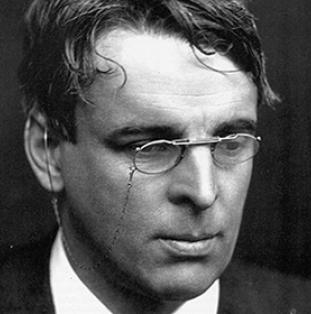
“Nor law, nor duty bade me fight,
Nor public man, nor cheering crowds,
A lonely impulse of delight
Drove to this tumult in the clouds;
I balanced all, brought all to mind,
The years to come seemed waste of breath,
A waste of breath the years behind
In balance with this life, this death.” – “An Irish Airman Forsees His Death”
This week’s topic of Yeats and his works of poetry have been some of my favorite discussions in the class so far. I think that Yeats’ mastery over his words and form are truly magical, and he has the power to evoke deep, latent emotions from within any soul. According to the National Library of Ireland, in 1923 when Yeats won the Nobel Prize in Literature, he proclaimed “I consider that this honour has come to me less as an individual than as a representative of Irish literature, it is part of Europe’s welcome to the Free State”. This stood out to me because it is clear through his poetry that Yeats saw himself as an extension of the Irish spirit and cause.
Yeats spent many of his living years witnessing an Ireland in turmoil, both economically and politically. It seems as Yeats grew in age, the more political his work became, almost reluctantly. In regards to the political conflicts and violence, Yeats seemed to regard war only as painful and strife- causing. In his poem “An Irish Airman Forsees His Death”, he writes from the point of view of a soldier who is not passionate about the war he is fighting, and in fact seems disconnected and apathetic about the outcome. This poem was written in the few years leading up to the Irish Civil War and the Easter Uprising. The soldier says what drove him to choose death over life was that “the years to come seemed waste of breath, a waste of breath the years behind”. The soldier calls life a “waste of breath” both in the past and in the future, and in the wider context of Ireland’s history and Yeats’ feelings towards war, it can be implied that Yeats thinks a life living in a country that is in political turmoil with itself is soul destroying. Yeats loved his country, and even made his identity and accomplishments one with Ireland, meaning that the pain of his country under war was also his pain.

I really enjoy your analysis, especially the idea of Ireland and Yeats as one entity. As you indicate, “…made his identity and accomplishments one with Ireland, meaning that the pain of his country under war was also his pain”.This is a significant point because throughout his poems he hints how significant it is to record and create the history of where you live through art. Yeats promotes the idea to live a life of deeds, so when you pass over, you can still live (through those deeds) and will remain in a way significant to the world. Great job on the blog! Keep it up!